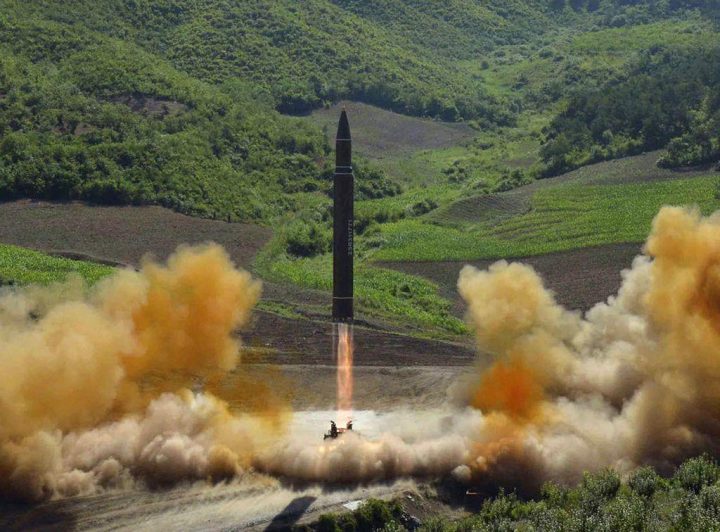By Gunnar Westberg
The author has been twice to North Korea and maintains contacts with physicians in the North Korean branch of International Physicians for the Prevention of Nuclear War in that country.
”If your country continues to develop nuclear weapons, you will be attacked, maybe with nuclear weapons”. This what we have told our colleagues from North Korea, at visits to Pyongyang or at international meetings. “Oh no,” they said. “Look at Saddam Hussein and Mohamad Ghadafi. They gave up their plans for nuclear weapons, and they were attacked”.
“Nuclear weapons development is not the only reason for the USA to attack. Oil is the other”, we said.
It turns out we were right. North Korea – DPRK – continued on the path to nuclear weapons and the President of the USA threatens to attack. The crisis is, for the moment fading, but is likely to increase when DPRK makes its next move. It should be emphasized that a misunderstanding on either side may provide the spark causing a devastating war.
Nuclear weapons cause wars.
The US public would in all likelihood not have accepted the attack on Iraq if it had not been for the mushroom cloud rising behind Ms Condoleezza Rice on TV when she declared “I do not want the smoking gun be a nuclear detonation over Manhattan”.
Similarly, the US leaders succeeded in making the citizens believe that Iran would develop nuclear weapons, and a military attack was considered.
If it had not been for the nukes, there would have been no real threat against North Korea. Not from South Korea, not from China and not from the USA. The Americans would probably have maintained a threatening posture – because “our country is running out of enemies” – but the governments of South Korea and China would have blocked any military attack by the US.
The leaders in Pyongyang also need the US as enemy in order to justify the heavy oppression of its citizens, and would continue to play their game.
Nuclear deterrence does not work. The enormous Russian nuclear arsenal has not prevented Nato from expanding up to the Russian borders. Israel has been attacked by its neighbours, undeterred by the Israeli nuclear weapons.
The USA tries to stop nuclear proliferation, preventing that nuclear weapons “fall into the wrong hands”.
But are the hands of President Donald Trump the “right hands”? Can he be trusted to carry the fate of mankind in his pocket?
And what do we know of the future leaders of Russia? They may well be more dangerous than either Mr Putin or Mr Trump.
The North Korea nuclear crisis has taught us at least four lessons:
1. Nuclear deterrence does not work.
2. Nuclear weapons can cause war.
3. There are no “safe hands” for nuclear weapons.
4. As long as there are nuclear weapons in the world we risk a nuclear war, possibly leading to the destruction of the entire human civilization.
On July 7th, 2017 an international agreement was reached, saying that because of the terrible human consequences of any use of nuclear weapons they must be considered illegal. A large majority of the world’s states, 122 countries, supported the treaty.
The nuclear weapon states will not join this treaty shortly. But they should take the message seriously. They should begin the multilateral negotiations they pledged to conduct already when they signed the Non-Proliferation Treaty (NPT) in 1968.
Bilateral negotiation between Russia and USA should also resume.
First, the immediate threats should be dealt with: No nuclear weapons should be on High Alert, a situation that may lead to the destruction of mankind by mistake. No threat of a nuclear attack should ever be made against a country that does not have nuclear weapons. The Comprehensive Nuclear Test Ban Treaty should be ratified.
Second, the two nuclear superpowers, USA and Russia, who have more than 90% f the nuclear weapons in the world, should agree on very deep cuts in their arsenals to a level of a few hundred of the large, “strategic”, nuclear weapons and all “tactical” nukes should be dismantled.
They should reiterate their conviction that a nuclear war cannot be won and should not be fought.
That means that the Russian leaders should stop talking about using “tactical” nuclear weapons in order to “escalate to de-escalate” and USA should stop modernizing its nuclear weapons in Europe.
The multilateral talks between all the states that have nuclear weapons should also aim at decreasing the risk of nuclear war by mistake.
In these respects the problems are different for different states. To solve these, the “small” nuclear weapon states must be convinced that the two big nuclear powers are serious in their endeavours to reduce their nuclear arsenals to the level of the “small” nuclear powers, which means a few hundred nukes each.
The path to a nuclear weapons free world is not chartered yet.
To do that will be easier when the nuclear weapon states finally show their determination to act responsibly and to honor their commitments.






